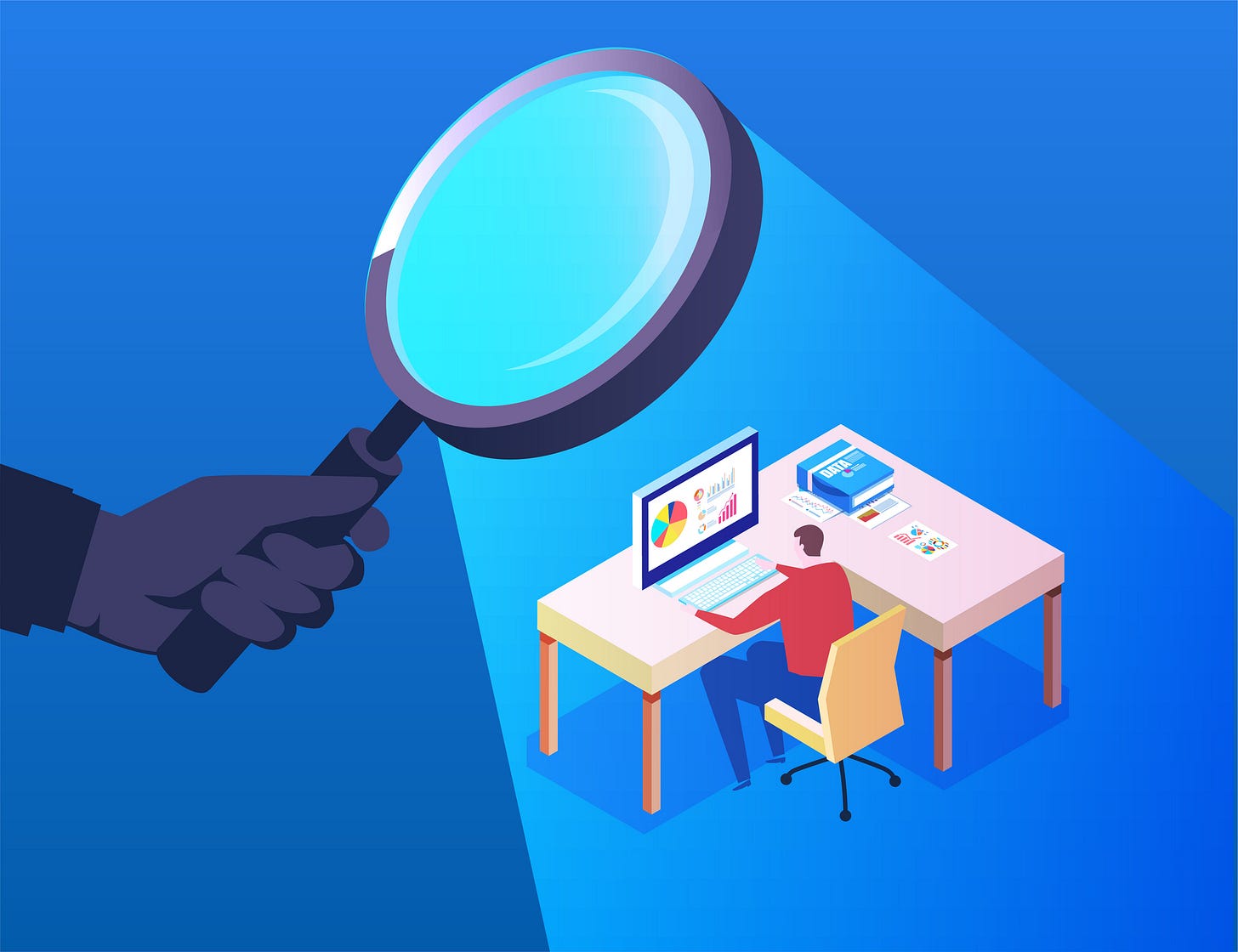Worrying about how much information your company can find out about you? It's a legitimate concern. Employees have been fired, and candidates for employment haven't been hired, because of what they have done in their spare time or posted online. The lines between work and play have blurred, and it's harder than ever to keep your personal life separate from your professional one.
It's important to remember that the more information that's public, of course, the more your employer or prospective employer can discover. Many employers check out candidates, and even employees, on social media, and what they find can help—or hurt—your career.
Whether they should be looking is another issue, but they can find a lot of information about you online. In addition to what you're doing on work computers or phones when you really shouldn't be using them, there are also ways your employer can learn about what you're doing off the clock.
That's important if, for example, you take a sick day when you're not really ill or schedule a job interview but tell your boss it's a doctor's appointment. If you get caught looking for a new job, you could end up getting fired from the one you have. Or if your politics don't jive with those of the company you work for or you went viral for all the wrong reasons, it can hurt your career and hinder your chances of getting hired.
How Your Company Can See What You're Doing On and Off the Clock
Here are some of the ways your company can see what you're doing at work and what you're doing on your own time.
1. Social Media
Social media gone wrong can ruin your career, but there are ways to ensure that it doesn’t happen to you. Remember whom you're connected with and keep that in the back of your mind when you're using social media. When you're sharing posts, be aware of your privacy settings and be sure that only the people you want to see your posts can view them. Be careful about what (and when) you post, especially if it's not appropriate for your boss or coworkers to see.
It’s a good idea to turn on Timeline Review on Facebook. When it’s on, you’ll get to approve any posts you’re tagged in before they appear on your profile. That way, you won’t have any unpleasant surprises that a colleague could see.
If you are a member of a large professional, or even nonprofessional, group on Facebook or LinkedIn, check who's in it so you know who can view what you post or comment on.
2. LinkedIn
Most of what you do on LinkedIn is public unless you change your settings to keep it private. It’s important to be careful about updating your profile, sharing information, and posting on LinkedIn.
When you’re job searching and currently employed, change your notification settings so your network doesn’t see your updates. You don’t want to advertise the fact that you’re revamping your profile. Here’s where to turn notifications settings off.
LinkedIn isn’t all about career networking and job searching anymore, so be careful about the comments you make and the posts you like. Your connections can see your activity. As with other social sites, be aware of what you do on company time.
3. Work Email and Slack
If you're job searching, it's never a good idea to use your work email address to apply for jobs. When you're using Slack, be careful what you're discussing. If you're using a work email or Slack account, the account administrator may be able to read your messages.
4. Work Phone
When you have a company-provided phone, your employer can view your device's text, call, and data logs, including the phone numbers you've called or texted. They may also be able to track your location to find out if you're somewhere you're not supposed to be while you're working.
5. YouTube
If you're using YouTube, ensure your personal account settings are private, and don't use your employer's business channel to search. The admin can see searches and viewing history for the company's channel. For example, you don't want to be the employee whose company noticed you were browsing job interview videos and how to get hired at Facebook videos on YouTube.
6. Google Calendar
Check your calendar sharing settings. If personal events and appointments are on your calendar, coworkers may be able to see them. If you're using a work Google Calendar, the administrator sets the default for what's viewable. Many administrators set the default to "See all event details." You can change specific events or your entire personal Google Calendar to private.
The same logic works for other calendar programs, too. Be sure you’re not sharing your personal information with everyone you work with.
7. Check-Ins
Be careful about check-ins via apps or websites where you can "connect" or share your location with friends, and they can see your activity.
For example, you can add friends on ClassPass, but then they can see what classes you are doing and when. All Trails, as another example, has a Live Share feature that stays on until you turn it off or finish the activity. You can check in on Facebook, Yelp, and other sites, and your friends can see where you are and where you’ve been. That's obviously not a good idea if you're somewhere you're not expected to be.
Keep Your Personal Life as Private as Possible
Most people use a ton of apps and are always connected, so it can be a challenge to keep track of what you're posting where and who's viewing what you're sharing. The best way to stay safe is to adjust your privacy settings to make as much as possible private.
It's much easier not to have to stress over what you're sharing than it is to inadvertently post something you shouldn't have and then have to try to undo it or fix it.
Our Favorite Tools & Tips
Back to Basics Job Searching: A reminder that job searching the old-fashioned way still works. You can write resumes and cover letters, apply for jobs, interview, and get hired without spending money on the (too many) people selling services that supposedly guarantee you’ll get hired or mass applying to hundreds of jobs at once (which doesn’t work). Here are tips to simplify and expedite your job search.
How To Recover From a Layoff: Have you lost your job? CareerOneStop has a step-by-step guide to help you recover from a layoff and get your career back on track. Also, review advice on applying for unemployment benefits so you can be sure you're collecting all the benefits you're entitled to.
mySkillsmyFuture: Are you interested in switching careers? You can use mySkillsmyFuture to explore career options where you can use the skills you already have. Enter your current or previous occupation to get a list of jobs that match, learn about how much they pay and the educational requirements, and get job listings.
News & Noteworthy
The Jobs Report Is Bad: The jobs report from the labor department showed the addition of only 142,000 jobs in August, less than the 160,000 jobs forecasted by economists. The bottom line is that the job market is as bad as you think it is, with only a few industries adding last month, and if you’re struggling to find your next position, you are not the problem.
Top 30 Companies Hiring for Remote Jobs: Data Engineer Jobs has compiled a list of 30 employers hiring for remote U.S. jobs (which aren’t all engineering jobs). The companies had three or more active job postings on one of the large job boards or job posting solutions, such as Dice, Workday, LinkedIn, Lever, and Indeed. There’s a brief description of what the company does, the types of jobs available, the Glassdoor rating, and a link to job postings.
Americans Are Working Less Hours: The Albany Times Union reports that the average American works fewer hours. The typical U.S. worker spends 41.9 hours on the job, down 1.5 hours a week from 30 years ago. In some locations, it’s down even more. In New York, for example, the average workweek in July 2024 was only 32.7 hours, down from 34.6 hours in 2007.
Sponsored by Remotive
When you’re looking for a 100% remote job, Remotive can expedite your search, and the basic version (2000+ jobs) is free. Learn more about how Remotive can accelerate your job search, and sign up for the Remotive Accelerator to access over 30,000 listings and the Slack community for a one-time fee.
Note: We may receive a small commission if you sign up using this link.






